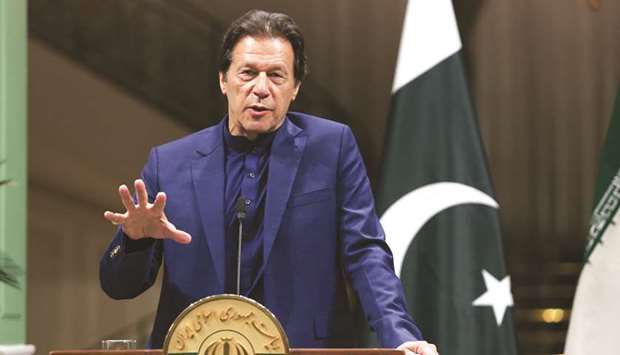Prime Minister Imran Khan had directed the Sindh Rangers to ensure that supply of goods from Sindh is maintained after it was found that the provincial government had failed to implement a transport agreement “in true spirit”.
The federal government’s chief spokesperson Dr Firdous Ashiq Awan said at a media briefing after a cabinet meeting yesterday that the prime minister expressed displeasure “in strong words” over the fact that despite the National Co-ordination Committee’s decision for all four provinces as well as Gilgit-Baltistan and AJK (Azad Jammu and Kashmir) to keep transport lines open for essential goods, the Sindh government did not implement the instruction.
She said that all export and import activity takes place through the Sindh shipping port, and due to administrative measures and a transport lockdown, exporters are facing challenges.
“The supply goes all the way to Gilgit-Baltistan. With no loaders present or those who pack goods or a lack of facilities, the supply chain is facing a delay.
“The Rangers will ensure all obstacles in the transport of goods are removed and the transport of goods is secured and ensured,” said Awan.
Khan’s adviser on information also said that the prime minister was informed during the cabinet meeting that coronavirus patients are being treated as “untouchables”.
Awan said that this is a “criminal act” and that the prime minister expressed great disapproval of the fact.
“Law enforcement agencies or hospital security officials mistreating them have been strictly told to treat them well and not treat them as criminals, and not to push them into quarantine,” she said.
The adviser said that admission into a quarantine facility should be carried out respectfully with the patients’ approval and their families’ consent, and that all governments had been told to strictly comply with this.
Yesterday Planning Minister Asad Umar spoke on the same subject during a media conference, saying that this poor treatment discourages people from coming forward to be tested.
There have been reports that police and other law enforcement agencies had been tracking down anyone with a history of international travel.
Some had been forced into quarantine, regardless of whether coronavirus had been confirmed, the reports said.
Pakistan has seen a steady increase in coronavirus cases over the past week despite a nationwide lockdown.
Yesterday Special Assistant to the Prime Minister on Health Dr Zafar Mirza confirmed 1,865 cases and 25 deaths from Covid-19, the disease caused by the coronavirus.
The country had a further 15,709 suspected cases, with more than 8,000 currently in quarantine, the health minister said.
Fearing an exponential rise in the number of infections, politicians and experts have called on the government to ramp up testing.
In response, Planning Minister Umar pledged that the country would be able to test 900,000 people a day by April 15.
It was learnt yesterday that truckers continue to face problems on the highways.
According to a report, goods transportation activities have declined by 80% as hostel and workshop facilities on highways remain suspended amid the lockdown.
Transporters and retailers complain of various issues arising out of the healthcare crisis, from lack of basic facilities on highways to rising transportation prices, as well as a labour shortage.
Prime Minister Khan has pointed this out multiple times that extreme measures taken by the provincial governments would affect the supply chain and that adequate measures should have been taken before lockdown to make sure that this does not happen.
Karachi Goods Carrier (KGC) president Rana Mohamed Aslam said that while the federal government had exempted goods transportation from the lockdown, basic facilities needed on highways were not available.
“Drivers are complaining of not having food and workshop facilities on highways,” he said.
If the government wanted a smooth supply of food items, it would have to ensure that the needed facilities are available along the highways, he added.
Inter-district and inter-provincial goods fares have decreased by more than 30%.
“Fares have dropped to Rs100,000 from Rs130,000-Rs140,000 from other provinces to Karachi,” he said. “In order to encourage transporters, the government should ensure all facilities on highways for drivers.”
He also complained that police personnel deployed near Port Qasim and at other entry points were harassing transporters and demanding bribes.
“Port to port transport in Karachi is suffering from police harassment, which is delaying deliveries,” Aslam claimed.
He urged the authorities to order officials of the various departments not to harass transporters.
The KGC president also pointed out that the lockdown had resulted in a shortage of workers, which was in turn affecting the availability of transport and its cost.
Goods transporters are allowed to transport food items, including sugar and pulses, but other non-food-related goods, including textile material, were not allowed.
“If goods transport is allowed to run smoothly, food security issue will not arise,” Aslam said. “Now transport from Punjab is coming for export. A lot of retail material used to come in, which is not allowed for now.”
On the other hand, retailers in the city said that local transport and pick-up drivers had increased the fare in the city by around 50%.
Due to workers’ shortage, the transport was also in short supply, and drivers increased the fare to Rs1,600 per trip.
Earlier, the rate was Rs1,000-Rs1,200 a trip from in the city, a shopkeeper said.

Prime Minister Khan: expressed displeasure ‘in strong words’ over the Sindh government’s failure to keep transport lines open for essential goods.
